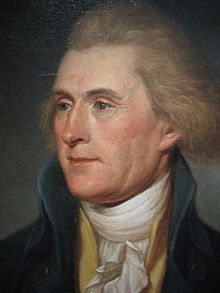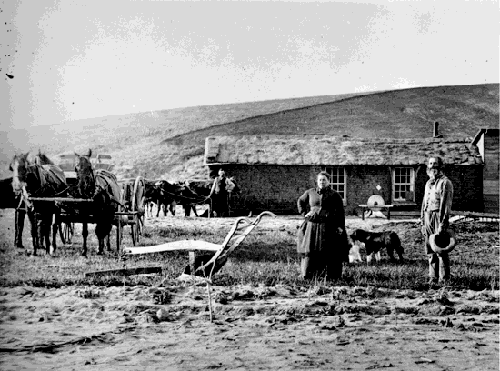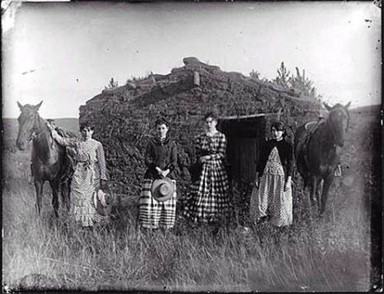
Thomas Jefferson was the original champion of the 'gentleman farmer'
In the early 19th century,
it was a common assumption among members of America's ruling class
that societies followed an inevitable sequence of development, from
hunting and gathering to herding, then came the agricultural arts,
and finally manufacturing.

Homesteaders on the plains in the 1880s.
To the planners of
the American Republic, the third state was the happiest. Hard
working farmers provided the ideal citizenry, at once anchored to
and supported by their property. After all, land ownership by the
lower classes was unheard of in Europe, so this was a new
development in western societies. They also believed that if
America went past the third stage it would face many of the same
problems that plagued Europe - a small elite addicted to luxury and
a large population of landless dependent people who served their
needs.
Thus, America's
hope lay in westward expansion, in the extended opportunities for
the growing population to acquire property and for the nation to
remain at the happy and virtuous stage of agriculture. In
America, said Jefferson, we have an immensity of land courting the
industry of the husbandman...those who labor in the earth are the
chosen people of God, if ever He had a chosen people, whose breasts
he has made his peculiar deposit for substantial and genuine
virtue.

The daughters of a homesteading family on the Great
Plains in the 1890s.
As time went
on, the business of expansion and land distribution entailed
unanticipated complications and hazards not envisioned by Jefferson
or any of the other founders. By the time of the Removal Era,
in the 1830s- just forty years after the nation's founding -
it was becoming increasingly clear that the anointed national
values of life, liberty, and the pursuit of happiness" could only
be acquired by white citizens who were willing to deny these same
aspirations to other races of men.
Between 1789
and 1834, Congress passed 375 laws pertaining to the sale of public
domain: adjusting the size of lots for sale; shifting the price per
acre; altering requirements for cash payments; and granting rights
of preemption in specific regions. Land distribution could
not keep up with demand. Settlers of the West took the view
that land was theirs for the taking, and the rules and regulations
of the government did not change the natural rights of the
citizens. Thus, a nation of laws which was legally bound and
responsible for protecting lands owned by Indian people found
itself trapped between the fierce desires of its citizens and the
solemn duties it was sworn to obey.
Related People
Related Events
Related Flashpoints